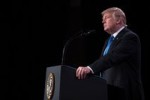Four Ways of Looking at Christian Nationalism
Advertisement
Subscriber-only Newsletter
By Ross Douthat
Opinion Columnist
Amid all the talk about the potential influence of Christian nationalism in a second Trump administration, and in the country as a whole, the phrase’s popularity has far outrun any coherent definition.
My colleague David French made an effort to remedy that issue in his column this week. I’m going to make my own attempt here, by suggesting four broad ways one could define a term like Christian nationalism:
Definition One: The belief that America should unite religion and politics in the same manner as the tribes of Israel in Leviticus and Deuteronomy (the more extreme case) or Puritan New England (the milder one) — with religious law enforced by the government, a theocratic or confessional state, an established form of Christianity, and non-Christian religions disfavored.
Definition Two: The belief that America is a chosen nation commissioned by God to bring about some form of radical transformation in the world — the spread of liberty, the triumph of democracy — and that both domestic and foreign policy should be shaped by this kind of providential aim.
Definition Three: The belief that American ideals make the most sense in the light of Christianity, that Christians should desire America to be more Christian rather than less and that American laws and policies should be informed by Christian principles to the extent possible given the realities of pluralism and the First Amendment.
Definition Four: Any kind of Christian politics that liberals find disagreeable or distasteful.
If I were referring to Christian nationalism, I would intend either the first or second definition. Over the years, when I’ve written on the subject, I’ve mostly focused on Definition Two — a style of politics in which Christianity is effectively subsumed into the American project, the universal church placed in the service of the universal nation.
In my book “Bad Religion,” published in 2012, I described this tendency as the “heresy of nationalism,” a “messianic Americanism” that makes liberal democracy into “a religion unto itself, capable of carrying out the kind of redemptive work that orthodoxy reserves for Christ and his church.” In this description, I had in mind everything from Manifest Destiny and progressive-era imperialism to Woodrow Wilson’s grand crusade and the utopianism of Great Society liberalism to the messianic aspects of both George W. Bush-era foreign policy and Barack Obama’s 2008 campaign. But also the shadow side of this utopianism, the apocalyptic style — Glenn Beck was a key example back then — that comes in when the messianic promise fails or disappoints.
Understanding this kind of Christian nationalism is essential to understanding American history — especially our moments of destructive hubris — and it’s a worldview that clearly endures even under more secular conditions. When Tea Party conservatives treat the Constitution or the founding as a semi-divine revelation or optimistic liberals talk about history having an “arc” or a “side,” they are participating in the messianic side of this inheritance. Meanwhile both the Trumpist right and the anti-Trump left can manifest the apocalyptic side, the sense of an American Eden corrupted, a promised land........
© The New York Times





















 Toi Staff
Toi Staff Gideon Levy
Gideon Levy Andrew Mitrovica
Andrew Mitrovica David Hutt
David Hutt Neve Gordon
Neve Gordon Patrick Gathara
Patrick Gathara Moncef Khane
Moncef Khane Ron Kronish
Ron Kronish Dr Ramzy Baroud
Dr Ramzy Baroud Rami G Khouri
Rami G Khouri Brahma Chellaney
Brahma Chellaney Tarik Cyril Amar
Tarik Cyril Amar Ghada Ageel
Ghada Ageel Steve Wenick
Steve Wenick Brad Glosserman
Brad Glosserman Fernando Romero Nuñez
Fernando Romero Nuñez
